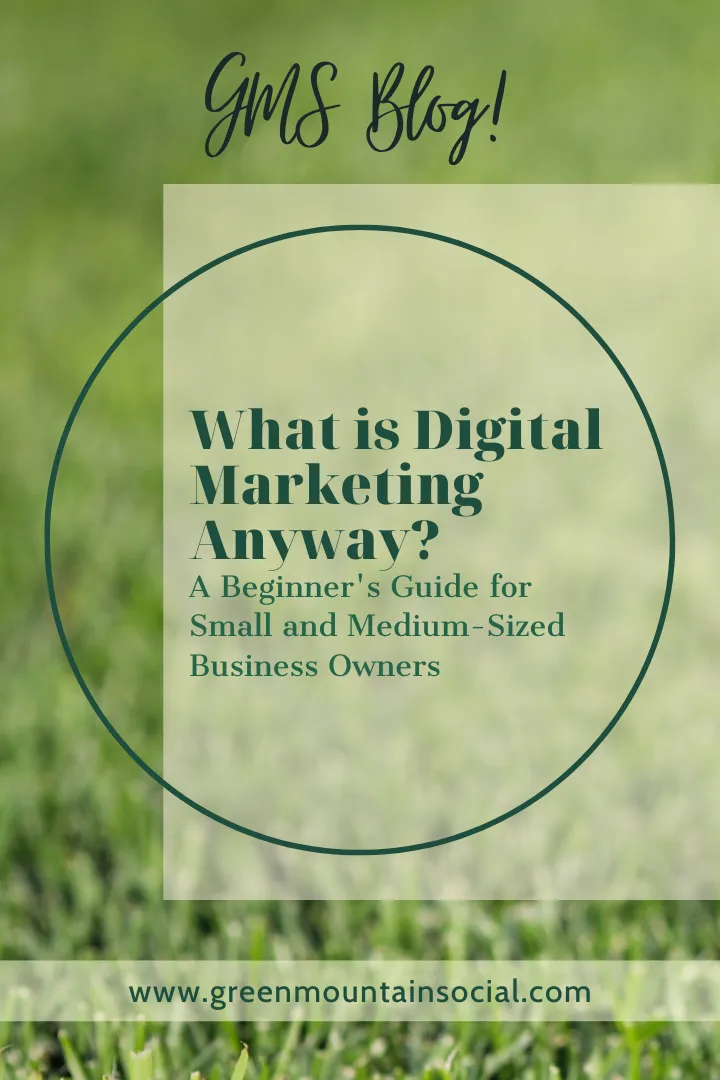
What is Digital Marketing Anyway? A Beginner's Guide for Small and Medium-Sized Business Owners
In today's digital era, small and medium-sized business owners frequently come across the term "digital marketing." But what does it genuinely mean? This blog post seeks to demystify digital marketing and offer a beginner's guide, equipping business owners with essential details to unlock the immense potential of digital marketing for our businesses.
Understanding Digital Marketing:
Digital marketing encompasses all strategic efforts that leverage digital channels and technologies to promote products and services. It involves harnessing the power of online platforms like websites, social media, search engines, email, and mobile apps to connect and captivate target audiences cohesively. Unlike traditional marketing methods, digital marketing equips businesses with measurable data and precise targeting capabilities, magnifying the impact and efficiency of marketing campaigns.
Key Components of Digital Marketing:
Website Optimization: A well-organized and optimized website serves as the cornerstone of your digital marketing endeavors. It should not only be visually captivating but also user-friendly and responsive across devices. Optimizing your website with relevant keywords, compelling content, and clear calls-to-action to effortlessly attract and convert visitors into loyal customers.
Search Engine Optimization (SEO): SEO is the art of enhancing your website's visibility in search engine results. By optimizing your website's content, meta tags, and technical aspects, you can drive organic (non-paid) traffic to your site, achieve higher rankings for relevant search keywords and unlock a gateway to increased visibility.
Social Media Marketing: Social media platforms provide a dynamic avenue for forging connections and engaging with your target audience. Creating and sharing valuable content, running paid targeted ads, and fostering two-way communication to build brand awareness, drive traffic, and generate leads and customers to propel your business to new heights.
Pay-Per-Click Advertising (PPC): PPC advertising empowers you to showcase your ads on search engines and other websites, paying only when someone clicks on your ad. Advertising on platforms like Google, Microsoft and social media offer robust targeting options, enabling you to reach specific demographics and meticulously track campaign performance.
Email Marketing: Email marketing involves sending tailored messages directly to a subscriber's inbox. It is a powerful tool for nurturing leads, cultivating customer relationships, and driving repeat business. Personalization and automation tools can be leveraged to deliver captivating content that resonates with your audience at scale as your business grows.
Content Marketing: Content marketing is the practice of crafting and distributing valuable and relevant content to captivate and engage your target audience. This includes blog posts, videos, infographics, and more. By offering information that truly enriches lives, businesses can establish authority, foster trust, and cultivate unwavering loyalty.
Analytics and Data Insights: Digital marketing equips you with robust analytics and data tracking tools to measure the effectiveness of your campaigns. Analyzing data empowers you to make data-driven decisions, optimize strategies, and refine your marketing efforts for remarkable results that fuel your business growth.
Final Thoughts
Digital marketing stands as a dynamic and indispensable pillar of a successful marketing strategy for small and medium-sized businesses. It encompasses an array of channels and tactics designed to connect with and captivate your target audience in the digital space. By embracing the vast opportunities offered by digital marketing, including the realm of paid social media ads, you can elevate your brand visibility, drive targeted traffic, generate leads, and foster unwavering customer loyalty. By embracing the digital age you can propel your business towards an extraordinary future.
TIP FOR THE WEEK: Don’t bite off more than you can chew! When a business first starts thinking through a marketing plan and strategy, many questions creep up. Where do we start? How far will my budget go? Do we need to do ALL of this? It can be quite overwhelming.
Start with getting very clear about your business goals for the next 12 months, and understanding the max budget you have available for marketing and advertising. Then, speak with a professional that you trust to talk through various approaches based on your goals and your budget. Do you need to do all of this immediately? Absolutely not. Marketing your business is a journey. And, like any journey, there is a beginning and a process unique to you, your business and your ideal customers. Take a deep breath, and stick with us as we delve deeper into fundamental marketing concepts and strategies, one week at a time!
COMING NEXT WEEK: What is a Funnel? How Funnels Drive Effective Paid Social Media Advertising Campaigns
When you’re ready, here are 3 ways to learn more about us, and how we can help:
1. Learn more about Heather & Aly and how and why Green Mountain Social came to be here.
2. Familiar with our services? Learn more
3. Are we a good fit? Schedule a free strategy session with us. We’ll take a look at your website and social profiles come prepared with feedback and tips to improve your online and social presence!

What is Digital Marketing Anyway? A Beginner's Guide for Small and Medium-Sized Business Owners
In today's digital era, small and medium-sized business owners frequently come across the term "digital marketing." But what does it genuinely mean? This blog post seeks to demystify digital marketing and offer a beginner's guide, equipping business owners with essential details to unlock the immense potential of digital marketing for our businesses.
Understanding Digital Marketing:
Digital marketing encompasses all strategic efforts that leverage digital channels and technologies to promote products and services. It involves harnessing the power of online platforms like websites, social media, search engines, email, and mobile apps to connect and captivate target audiences cohesively. Unlike traditional marketing methods, digital marketing equips businesses with measurable data and precise targeting capabilities, magnifying the impact and efficiency of marketing campaigns.
Key Components of Digital Marketing:
Website Optimization: A well-organized and optimized website serves as the cornerstone of your digital marketing endeavors. It should not only be visually captivating but also user-friendly and responsive across devices. Optimizing your website with relevant keywords, compelling content, and clear calls-to-action to effortlessly attract and convert visitors into loyal customers.
Search Engine Optimization (SEO): SEO is the art of enhancing your website's visibility in search engine results. By optimizing your website's content, meta tags, and technical aspects, you can drive organic (non-paid) traffic to your site, achieve higher rankings for relevant search keywords and unlock a gateway to increased visibility.
Social Media Marketing: Social media platforms provide a dynamic avenue for forging connections and engaging with your target audience. Creating and sharing valuable content, running paid targeted ads, and fostering two-way communication to build brand awareness, drive traffic, and generate leads and customers to propel your business to new heights.
Pay-Per-Click Advertising (PPC): PPC advertising empowers you to showcase your ads on search engines and other websites, paying only when someone clicks on your ad. Advertising on platforms like Google, Microsoft and social media offer robust targeting options, enabling you to reach specific demographics and meticulously track campaign performance.
Email Marketing: Email marketing involves sending tailored messages directly to a subscriber's inbox. It is a powerful tool for nurturing leads, cultivating customer relationships, and driving repeat business. Personalization and automation tools can be leveraged to deliver captivating content that resonates with your audience at scale as your business grows.
Content Marketing: Content marketing is the practice of crafting and distributing valuable and relevant content to captivate and engage your target audience. This includes blog posts, videos, infographics, and more. By offering information that truly enriches lives, businesses can establish authority, foster trust, and cultivate unwavering loyalty.
Analytics and Data Insights: Digital marketing equips you with robust analytics and data tracking tools to measure the effectiveness of your campaigns. Analyzing data empowers you to make data-driven decisions, optimize strategies, and refine your marketing efforts for remarkable results that fuel your business growth.
Final Thoughts
Digital marketing stands as a dynamic and indispensable pillar of a successful marketing strategy for small and medium-sized businesses. It encompasses an array of channels and tactics designed to connect with and captivate your target audience in the digital space. By embracing the vast opportunities offered by digital marketing, including the realm of paid social media ads, you can elevate your brand visibility, drive targeted traffic, generate leads, and foster unwavering customer loyalty. By embracing the digital age you can propel your business towards an extraordinary future.
TIP FOR THE WEEK: Don’t bite off more than you can chew! When a business first starts thinking through a marketing plan and strategy, many questions creep up. Where do we start? How far will my budget go? Do we need to do ALL of this? It can be quite overwhelming.
Start with getting very clear about your business goals for the next 12 months, and understanding the max budget you have available for marketing and advertising. Then, speak with a professional that you trust to talk through various approaches based on your goals and your budget. Do you need to do all of this immediately? Absolutely not. Marketing your business is a journey. And, like any journey, there is a beginning and a process unique to you, your business and your ideal customers. Take a deep breath, and stick with us as we delve deeper into fundamental marketing concepts and strategies, one week at a time!
COMING NEXT WEEK: What is a Funnel? How Funnels Drive Effective Paid Social Media Advertising Campaigns
When you’re ready, here are 3 ways to learn more about us, and how we can help:
1. Learn more about Heather & Aly and how and why Green Mountain Social came to be here.
2. Familiar with our services? Learn more
3. Are we a good fit? Schedule a free strategy session with us. We’ll take a look at your website and social profiles come prepared with feedback and tips to improve your online and social presence!
COPYRIGHT © 2025 GREEN MOUNTAIN SOCIAL. ALL RIGHTS RESERVED.




